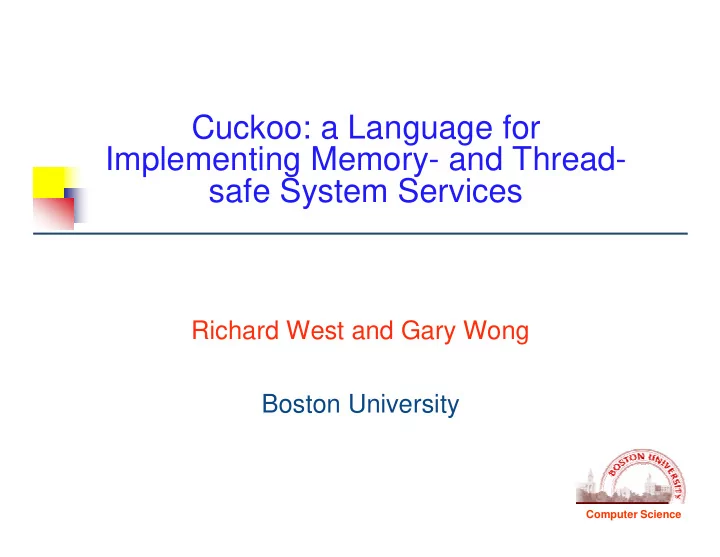

Cuckoo: a Language for Implementing Memory- and Thread- safe System Services Richard West and Gary Wong Boston University Computer Science
Introduction Computer Science � Recent emphasis on COTS systems for diverse applications � e.g., Linux for real-time � Desirable to customize system for application- specific needs → system extensibility � Dangers with customizing kernels with untrusted code � Can use type/memory-safe languages, hardware protection, software-fault isolation, proof-carrying codes etc � Here, we focus on language support for memory- and thread-safety
Why Thread Safety? Computer Science � Languages such as Cyclone support memory- safety using “fat pointers” but these are not atomically updated � Asynchronous control flow can lead to memory violations � Asynchronous control flow fundamental to system design! � Support for interrupts, signals etc � Multi-threaded address spaces
Memory Safety Computer Science � We define a program as memory safe if it satisfies the following conditions: � It cannot read/write memory which is not reserved by a trusted runtime system; � It cannot jump to any location which is not the address of a trusted instruction. � We enforce type safety only in so far as required to enforce memory safety � Memory safety in Cuckoo does not guarantee program correctness
Memory Safety Issues Computer Science � Stack safety � We do not assume hardware detection of stack overflows � Pointers and array bounds � We assume that bound information is associated with the array itself, and is immutable; bounds are not associated with (mutable) pointers � Pointer arithmetic is ruled out � Instead, arithmetic on indices into arrays referenced by pointers � Dangling pointers � We rely on the type system to rule out dangling pointers to automatic storage � Type homogeneity � Dynamic memory allocator is type-aware � Memory reuse is permitted only between compatible types
Example: Stack Checking Computer Science extern int a(…) { // suppose stack usage is small // in this block char a_local; if (…) b(); } static void b (…) { // again, minimal stack usage if (…) c(); } static int c() { char c_local[65536]; // stack-allocate lots of memory … }
Thread Safety Computer Science � Memory-safe checks must be atomic with respect to multiple threads of control � Null pointer checks: � Made atomic by loading pointer value into a register, R � R is guaranteed to be used for both the checking and dereferencing of any pointer � Array bound checks: � Made atomic by associating array bound info not with pointer BUT array � Since array sizes are immutable bound checks can never involve race conditions
Array Types in C versus Cuckoo Computer Science � Char a[5]; � Char c1=*a; // valid in C but not Cuckoo � Char c2=a[0]; // valid in Cuckoo, s.t. c2=c1 as in C � Char c3=(*a)[0]; // also valid in Cuckoo
Example Casts in C and Cuckoo Computer Science struct foo { int a[5]; char *s; } struct foo *p; int x=*((int *)p); // legal in C but not Cuckoo int y=*((int (*)[5])p); // also illegal in Cuckoo int z=((int (*)[5])p)[0]; // now legal in Cuckoo // assigns z 1 st element of array
Potentially unsafe Memory Realloc Computer Science int *p; char **q; p=new(int); // heap-alloc an integer …delete(p); // release memory ref’d by p q=new(char *); // reuse memory freed at addr p *p=123; // assign values after p is freed …**q=45; // memory[123]=45 -> dangerous! ������������������������������������������� ���������������������������������������������������� �����
Experimental Results Computer Science Compiler Time (user) Time (system) Size (code) Size (data) Size (BSS) SUBSET SUM Cuckoo 30.96 n/a 2377 288 152 gcc –O2 17.86 n/a 1833 280 192 gcc 24.75 n/a 1945 280 192 PRODUCER-CONSUMER Cuckoo 2.50 5.13 2527 308 428 gcc –O2 2.46 5.10 2001 300 480 gcc 2.50 5.14 2093 300 480 FIND-PRIMES Cuckoo 10.17 n/a 1301 260 10016 Cuckoo (OPT) 6.78 n/a 1285 260 10016 gcc 9.56 n/a 874 252 10032 gcc –O2 3.57 n/a 814 252 10032 Cyclone 12.43 n/a 91721 3340 59996 SFI 10.79 n/a 970 252 10032 ���������������������������������� !���������������
Exec. Times (Parallel Subset-sum) Computer Science Compiler Parallel time (real) Cuckoo 9.45 gcc –O2 4.59 gcc 7.40 "#��������������$�������������������������������������%� �����������#�������&������
Example: Unaligned Address Problem Computer Science static void bad(void) { volatile int x=0xBADC0DE; } extern int main(void) { union foo { char *data; void (*code)(void); } bar; bar.code=bad; bar.data+=10; // whatever is offset to 0xBADC0DE bar.code(); return 0; }
Cuckoo versus Alternatives Computer Science System C Cyclone Java SFI Cuckoo � � � � Efficient memory usage � � � Memory safe Y/N � � � Stack overflow checking � � � Multithreaded memory safe � � � � Operate without garbage collection � � � Unrestricted allocation w/o garbage collection
Conclusions and Future Work Computer Science � Multithreaded memory safety can be a key issue in certain domains e.g., extensible systems � Safety can be enforced for single- and multi- threaded programs with relatively low overhead � Future work: � Further investigating and optimising the cost of dynamic memory allocation � Tradeoffs between permissive type systems and overheads of runtime checks � Implementation and analysis of a trusted runtime system
Recommend
More recommend